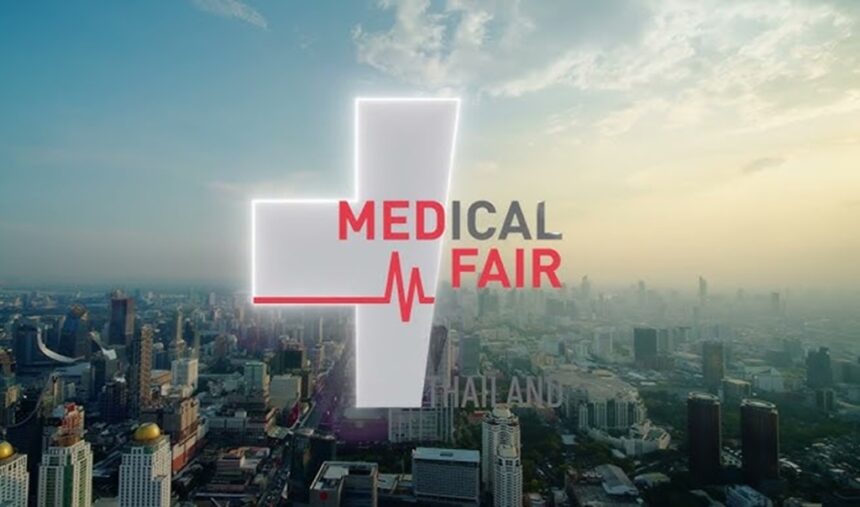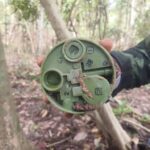BANGKOK — Messe Düsseldorf Asia, in close collaboration with both public and private sectors, is accelerating efforts to position Thailand as a regional centre for medical and healthcare innovation.
The company is set to host MEDICAL FAIR THAILAND 2025, a flagship biennial exhibition that brings together healthcare providers, medical manufacturers, and healthcare innovators from over 40 countries, underscoring Thailand’s role as a strategic gateway to ASEAN and fostering global networks for innovation and healthcare exchange.
Two major Thai government agencies — the National Innovation Agency (Public Organization (NIA) and the National Science and Technology Development Agency (NSTDA) — have stressed the importance of advancing deep technology (Deep Tech) and promoting local innovation to boost domestic application and strengthen Thailand’s regional standing in the medical technology sector.
Messe Düsseldorf Asia has further highlighted three major medical opportunities for Thailand, including medical and wellness tourism, medical manufacturing, and elderly care solutions, all of which are projected to drive an average annual market expansion of 5.5-7.0% domestically, with exports expected to grow by 6.5-7.5% per year.
Dr Krithpaka Boonfueng, Executive Director of the National Innovation Agency (Public Organization) (NIA), stated that as Thailand’s Focal Conductor of innovation, NIA plays a crucial role in promoting and supporting national innovation development. The agency is focused on driving innovations that generate positive social and economic impact, or what is known as Impact Tech.
Among these, advanced medical innovation stands out as a key engine, helping to enhance quality of life, generate high-value economic outcomes, and align with the government’s vision of positioning Thailand as a leading Wellness and Medical Service Hub.
This ambition is underpinned by several driving forces: Thailand’s transition into an ageing society, which is increasing demand for long-term care and rehabilitation technologies; the rising incidence of illnesses and emerging diseases; and the growth of the health and wellness tourism sector, which is prompting healthcare providers across the country to invest in upgrading their medical technologies and capabilities to cater to international patients.
Dr Krithpaka added that, given these positive trends, NIA sees a great opportunity for Thailand’s medical innovation sector to benefit both as a domestic manufacturer and as a global brand builder. A key success factor lies in enhancing Thailand’s capabilities in deep technology, enabling the country to emerge as a regional leader in setting standards for medical innovation.
This focus aligns with NIA’s core strategy: to foster the development and elevation of Thai medical technology entrepreneurs comprehensively and sustainably.
“Medical deep tech — including AI diagnostics, genomics, medical robotics, and advanced biomaterials — is expanding rapidly across the globe. These technologies represent structural advantages that Thailand can develop domestically. If we can build these capabilities consistently, it will not only reduce dependence on imported technologies but also strengthen the role of Thai innovators within the regional ecosystem.
Thailand already possesses a strong medical and healthcare infrastructure, deep knowledge resources, and access to a diverse population. These assets are powerful enablers for growth in the country’s medical industry.
NIA has long promoted deep tech in the medical sector through its 4G framework, including Groom-cultivating medical innovation districts to spark ideation and facilitate real-world testing. Currently, there are four such districts: two in Bangkok (Yothi Medical Innovation District and Siriraj Medical Innovation District), one in Chiang Mai (Suandok Medical Innovation District), and one in Khon Kaen (Kangsadan Medical Innovation District), Grant– offering diverse funding mechanisms to support medical innovation development, Growth – accelerating commercialisation through the ‘Spear H’ scale-up programme, designed to advance investment readiness and expansion into international markets, Global – promoting Thai medical innovation brands on the global stage, such as through participation at MEDICA by the Messe Dusseldorf group – held in Germany — and is one of the world’s most influential MedTech trade fairs.”
To further open up market opportunities for Thai medical startups and SMEs, NIA is collaborating this year with Messe Düsseldorf Asia and a network of public and private sector partners to lead a delegation of eight NIA-supported startups to participate in MEDICAL FAIR THAILAND 2025. This major international platform will not only allow Thai startups to present innovations tailored to their target market but also help them forge regional partnerships and expand product development, services, and business models.
At the same time, it will contribute to building a robust innovation ecosystem that supports long-term, sustainable growth of Thai medical technology, while showcasing the strength of Thailand’s innovation system and further encouraging widespread adoption of high-quality Thai medical brands. Concluded Dr Krithpaka.
Assoc Prof Dr Termsak Sirikirin, Director of the National Metal and Materials Technology Center (MTEC) under the National Science and Technology Development Agency (NSTDA), stated that Thailand continues to rely heavily on the importation of medical devices and technologies, with an annual import value of over 60 billion baht.
A major reason for this long-standing dependence lies in the historically low investment in research and development (R&D). The issue, he noted, is not merely a lack of ideas or capable talent, but rather a structural challenge — one rooted in policy gaps and inadequate support systems that fail to fully foster innovation.
As the country’s leading agency for science, technology, and innovation, NSTDA places strong emphasis on advancing upstream R&D as a way of building a solid foundation for industry, particularly in the medical and healthcare sectors, which are key drivers of both economic growth and public wellbeing.
The agency is committed to developing medical technologies and innovations that can enhance national competitiveness, reduce import dependence, and position Thailand as a comprehensive medical hub for the ASEAN region, with a particular focus on the medical device industry.
At present, NSTDA holds a portfolio of more than 700 research projects and knowledge assets related to the medical and healthcare domain. These span a wide spectrum, from biomaterials and medical implants to diagnostic technologies, biotechnology, and regenerative medicine. Many of these innovations are ready to be transferred to the private sector for commercialization.
One notable example is ‘M-Bone’, a bone graft substitute developed for implantation in the human body — the first of its kind in Thailand to meet international standards. This innovation alone has helped reduce Thailand’s dependence on imported bone graft materials by hundreds of millions of baht annually.
Beyond this, NSTDA actively supports the real-world application of research outcomes within the healthcare sector, working closely with hospitals, universities, and medical device entrepreneurs to ensure that innovations are implemented effectively and deliver tangible national impact.
“NSTDA’s role goes far beyond the laboratory. We are committed to forging strategic collaborations with private sector partners and global allies, enabling the transfer of our research outputs into commercial applications. These partnerships help transform cutting-edge science into products and services that meet the demands of modern healthcare systems — especially in areas such as ageing society, personalised medicine, and preventive healthcare. We are also advancing technologies aligned with emerging trends, including IoT, 5G, AI, and machine learning,” Assoc Prof Dr Termsak explained.
He concluded by emphasizing that MEDICAL FAIR THAILAND 2025 presents an exceptional opportunity to showcase the capabilities of Thai entrepreneurs and startups on the global stage. “NSTDA stands ready to serve as a strategic driver, supporting the sustainable growth of Thailand’s medical device industry and strengthening its international competitiveness.”
Ms See Lay Eng, Deputy Portfolio Director of MEDICARE ASIA at Messe Düsseldorf for Asia, shared that based on regional market insights and sector performance, Thailand has emerged as one of Southeast Asia’s key strategic locations for medical innovation, driven by strong government support, a growing local industry, and increasing international collaboration.
The country stands out for its robust infrastructure, internationally recognised healthcare systems, and government and private sector policies that welcome investment in health technology. These strengths form a solid foundation for technological, innovation, and health service expansion internationally.
Messe Düsseldorf Asia further evaluated Thailand’s key opportunities in:
- Medical and Wellness Tourism: The ASEAN region has become a significant hub for medical and wellness tourism, with Thailand, Malaysia, and Singapore serving as leading providers. These countries can attract medical tourists through affordable treatment options, internationally recognized standards, and holistic care approaches. Specifically for Thailand, the medical tourism market was valued at 433.81 million US Dollars in 2024, and it is projected to grow at a compound annual growth rate (CAGR) of 15.24%, reaching 1,349.10 million US Dollars by 2035. This impressive growth underscores the strong confidence in the quality and cost-effectiveness of Thailand’s medical services.
- Thailand’s medical device manufacturing sector has become a key pillar of its healthcare ecosystem, supported by a strong industrial base, strategic government policies, and increasing international demand. The domestic medical device market is forecast to grow by 7% annually, while exports are projected to rise by 7.5%—reflecting Thailand’s role as a leading exporter in ASEAN. Key areas of strength include consumables, diagnostic equipment, and rehabilitation devices. Investment incentives from the Thailand Board of Investment (BOI), along with dedicated industrial zones in the Eastern Economic Corridor (EEC), are helping to attract foreign investment and foster local innovation. With R&D covering biomaterials, implants, diagnostics, and production technologies, Thailand is steadily advancing its capabilities in high-value medical manufacturing, positioning itself as a vital node in the regional MedTech supply chain.
- Medical solutions for the ageing population: Not only in Thailand, but throughout the ASEAN region, one of the fastest demographic shifts in the world is currently underway. The increasing elderly population is becoming a key driver, fuelling higher demand and spending on a wide range of products, services, and treatment solutions. This demographic change also contributes to growth across the healthcare sector, including hospitals, clinics, nursing homes, and home care services.
To reinforce Thailand’s strategic role, MEDICAL FAIR THAILAND 2025 will feature over 1,000 exhibitors from more than 40 countries, including 20 national and country pavilions, covering technologies and solutions in various fields, e.g. hospitals, diagnostics, pharmaceuticals, medical supplies, rehabilitation, and digital health. The event will also include co-located industry seminars and workshops on healthcare innovations and trends, rehabilitation medicine, and more.
Reflecting the sector’s continued evolution—from rising medical manufacturing capabilities to an ageing population driving demand for eldercare solutions—this year’s edition of MEDICAL FAIR THAILAND introduces several new showcase zones that align with these key industry trends.
The LaunchPad Zone will spotlight emerging start-ups and breakthrough innovations, while the Community Care Zone focuses on eldercare, rehabilitation, and long-term care technologies. Meanwhile, the expanded Medical Manufacturing Zone highlights high-value manufacturing, covering advanced systems, medical devices, automation, and materials innovation, underscoring how the exhibition continues to echo and support industry growth on multiple fronts.
MEDICAL FAIR THAILAND 2025 will co-locate with GITEX Digi Health and Biotech Thailand for the first time. Inspired by GITEX GLOBAL, one of the world’s largest technology and start-up shows, this synergy will boost the presentation of cutting-edge health technologies on the global stage.
MEDICAL FAIR THAILAND is supported by numerous organizations, including the Ministry of Public Health, the Ministry of Industry, NIA, NSTDA, and the Thailand Convention and Exhibition Bureau (TCEB). It will be held from 10-12 September 2025 at BITEC, Bangna.
For further information about MEDICAL FAIR THAILAND 2025, please visit: www.medicalfair-thailand.com
Related News:
Health Department Dispels Reports of Arsenic in Children from Kok River














